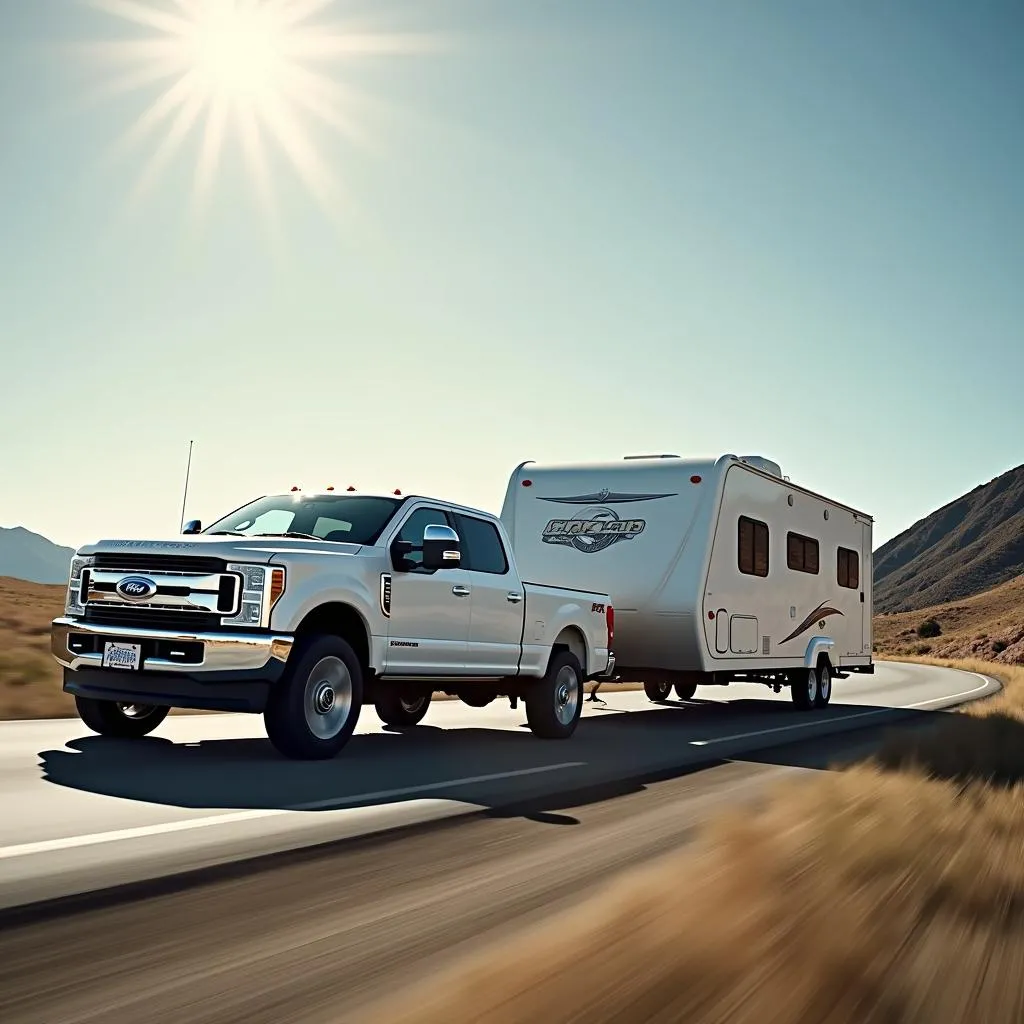“Hitting the open road, wind in your hair, home on your back” – the allure of the travel trailer life is undeniable. But before you hitch up and head for the Grand Canyon or Yellowstone, there’s a crucial question to answer: How Much Do Travel Trailers Weigh?
Knowing the weight of your travel trailer isn’t just about obeying the law (though that’s important!). It’s about safety, efficiency, and ensuring a smooth, enjoyable journey. Imagine this: You’re cruising down the Pacific Coast Highway, the sun setting over the ocean, when suddenly, your underpowered vehicle struggles with the trailer on a steep incline. Not the idyllic road trip you envisioned, right?
 Travel Trailer on a Mountain Road
Travel Trailer on a Mountain Road
Decoding Travel Trailer Weight: It’s More Than Meets the Eye
When discussing travel trailer weight, we’re not just talking about a single number. There are several terms you need to be familiar with:
- UVW (Unloaded Vehicle Weight): This is the weight of the trailer as it comes from the manufacturer, without any cargo, water, or propane. Think of it like the trailer’s “birthday suit” weight.
- Dry Weight: Often used interchangeably with UVW, but can sometimes include a few factory-installed options. Always double-check with the manufacturer.
- Cargo Carrying Capacity (CCC): This is the maximum weight of everything you can safely add to your trailer, including luggage, food, water, propane, and gear. Picture this as your trailer’s “packing limit.”
- GVWR (Gross Vehicle Weight Rating): The absolute maximum weight your trailer can handle, including its UVW and CCC. Exceeding this is a recipe for disaster, like overloading a camel on the Silk Road.
- Hitch Weight: The downward force exerted by the trailer’s tongue on your vehicle’s hitch. It’s crucial for safe towing and should be around 10-15% of the trailer’s GTW.
Why Knowing Your Travel Trailer’s Weight is Non-Negotiable
- Safety First: Overloading your trailer or exceeding its GVWR can lead to dangerous sway, tire blowouts, and even accidents. Imagine trying to navigate the winding roads of the Appalachian Mountains with an unstable trailer!
- Legal Matters: Every state has weight restrictions for trailers. Driving an overweight trailer can result in hefty fines and even impoundment.
- Vehicle Compatibility: Your tow vehicle needs to be powerful enough to safely tow your trailer’s weight. Trying to tow a heavy trailer with a small car is like asking a donkey to pull a chariot – it’s not going to end well.
- Fuel Efficiency: The heavier your trailer, the more fuel your tow vehicle will consume. Knowing your trailer’s weight helps you choose the most fuel-efficient towing setup, saving you money and reducing your carbon footprint.
 Tow Vehicle and Travel Trailer
Tow Vehicle and Travel Trailer
Factors Influencing Travel Trailer Weight
The weight of a travel trailer can vary significantly depending on:
- Size: It’s simple physics – larger trailers generally weigh more than smaller ones.
- Type: Lightweight fiberglass trailers tend to be lighter than their aluminum counterparts.
- Amenities: Fancy features like slide-outs, generators, and washing machines add weight.
- Materials: Solid surface countertops and hardwood cabinets look beautiful but contribute to a heavier trailer.
Planning Your Trip: Essential Weight Considerations
- Packing Light: Channel your inner minimalist! Pack only the essentials and leave bulky, unnecessary items at home. Remember, every ounce counts on the road.
- Distribute Weight Evenly: Load heavier items over the trailer’s axles and distribute weight evenly on both sides. Imagine trying to balance a seesaw – an even distribution is key!
- Hitch Weight is Key: Maintain a proper hitch weight by adjusting your load distribution. This ensures stable towing and prevents dangerous trailer sway.
 Packing a Travel Trailer
Packing a Travel Trailer
FAQs: Answering Your Burning Questions
How much does a small travel trailer weigh?
Small travel trailers, often referred to as teardrop trailers, can weigh as little as 1,000 pounds, making them ideal for smaller vehicles. However, larger small trailers can weigh up to 5,000 pounds.
What is the average weight of a travel trailer?
The average travel trailer weight can range from 5,000 to 7,000 pounds. However, larger, more luxurious models can easily exceed 10,000 pounds.
How do I find the weight of my travel trailer?
You can find your travel trailer’s weight on the manufacturer’s sticker, usually located near the door or on the frame. This sticker will list the UVW, GVWR, and other important weight specifications.
Travel Light, Travel Safe, Travel Smart
Understanding travel trailer weight is paramount for a safe and enjoyable journey. By following these guidelines, you can embark on your next adventure with confidence, knowing you’re well-prepared for the road ahead.
For more tips on choosing the right travel trailer and planning your next adventure, visit TRAVELCAR.edu.vn.

